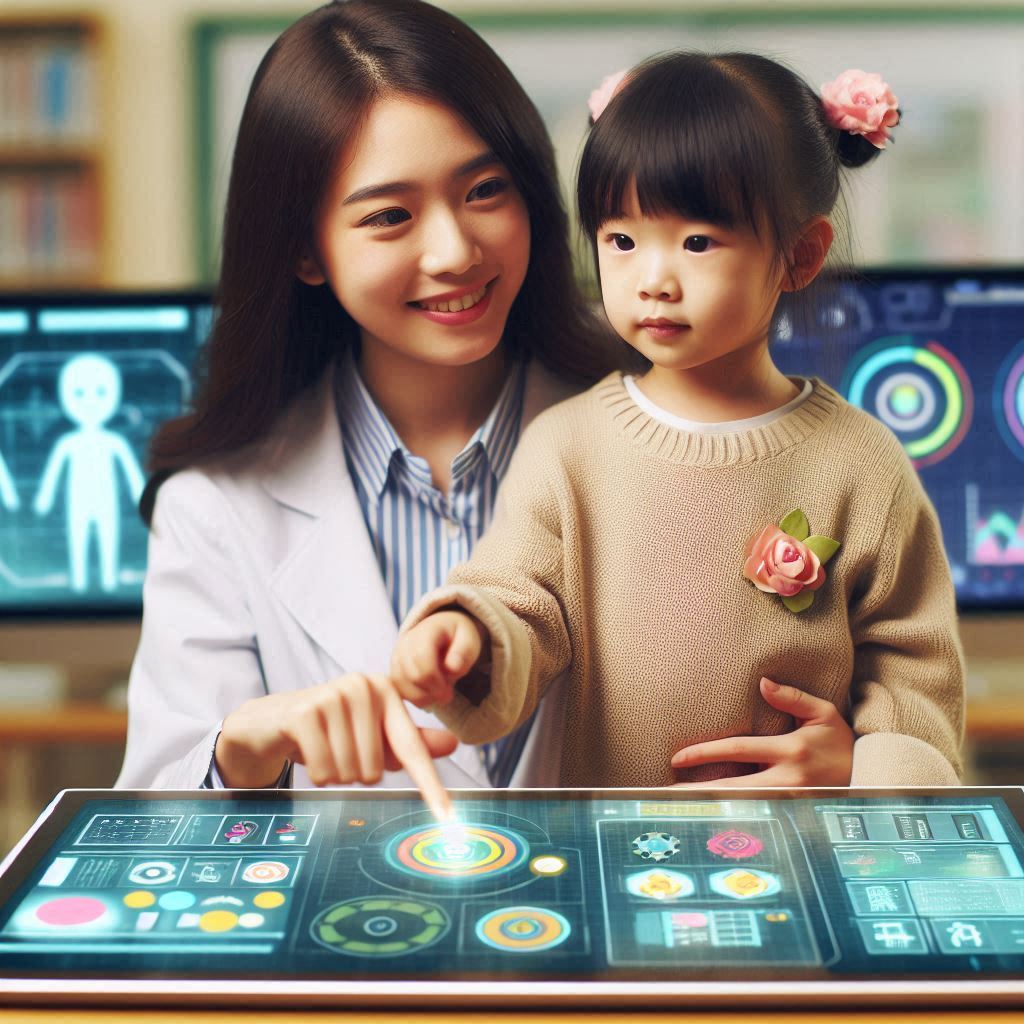Introduction
The evolution of education technology.
Education technology has evolved dramatically over the years.
From chalkboards to digital classrooms, innovations have transformed learning environments.
With the rise of computers, interactive tools emerged, enhancing student engagement.
Today, artificial intelligence (AI) is making significant strides in education.
It offers solutions that cater to diverse learning needs and challenges.
AI in education and its growing relevance.
AI’s relevance continues to grow in educational settings.
Schools and institutions increasingly adopt these tools to support teaching.
Students experience personalized learning experiences that adapt to their individual requirements.
AI-powered tutors emerge as crucial components in this shift. They bridge learning gaps and provide tailored support for every student.
Thesis statement: AI-powered tutors are revolutionizing student learning outcomes by providing personalized, efficient, and engaging educational experiences.
The impact of AI-powered tutors is significant.
They personalize educational experiences, adapting to students’ unique learning styles.
These tutors analyze performance data, identifying areas needing improvement.
They offer targeted exercises, ensuring efficient learning.
Students engage in practice that resonates with their abilities, enhancing their understanding.
Moreover, AI-powered tutors make education more accessible.
They provide on-demand support and resources, breaking barriers to learning.
Students access unique educational materials anytime and anywhere.
This flexibility fosters self-directed learning and encourages independence.
Engagement is another crucial aspect of AI-driven education.
Interactive features, such as gamification and real-time feedback, keep students motivated.
These elements make learning enjoyable and relevant.
AI-powered tutors maintain students’ interest, improving retention rates and overall performance.
Therefore, AI-powered tutors transform student learning outcomes significantly.
They offer personalized, efficient, and engaging educational experiences.
As education continues to evolve, the role of AI will likely expand.
Embracing this technology can enhance teaching and learning approaches across various educational institutions.
Understanding AI-Powered Tutoring Systems
AI-powered tutors revolutionize the educational landscape.
They deliver personalized learning experiences to students.
These systems utilize cutting-edge technology to enhance educational outcomes.
Let’s explore their definition, functionalities, and capabilities.
Definition of AI-Powered Tutors and Their Functionalities
AI-powered tutors refer to software or platforms that use artificial intelligence to assist students.
They provide interactive, personalized educational support.
These systems can analyze a student’s needs and learning patterns.
They adjust the teaching methods accordingly to improve understanding and retention.
The primary functionalities of AI-powered tutors include:
Put Your Tech Company on the Map!
Get featured on Nicholas Idoko’s Blog for just $50. Showcase your business, boost credibility, and reach a growing audience eager for tech solutions.
Publish Now- Personalized Learning: Tailors lessons based on individual learning styles and paces.
- Assessment and Feedback: Offers immediate feedback on assignments and quizzes.
- Interactive Learning: Engages students through gamification and interactive content.
- 24/7 Availability: Provides assistance anytime, allowing flexibility in study schedules.
- Data Tracking: Monitors student progress and identifies areas needing improvement.
Machine Learning and Natural Language Processing in Education
Machine learning and natural language processing (NLP) play essential roles in AI-powered tutoring.
The algorithms analyze vast amounts of data.
They recognize patterns and derive insights to improve learning outcomes.
Key aspects of machine learning in education include:
- Adaptive Learning: Adjusts the difficulty level based on student performance.
- Predictive Analytics: Anticipates students’ future performance and potential challenges.
- Content Recommendation: Suggests resources and materials tailored to individual needs.
NLP allows systems to process and understand human language.
This capability enhances the interaction between students and AI tutors.
Important features of NLP in education include:
- Speech Recognition: Allows voice commands and responses for a seamless learning experience.
- Text Understanding: Interprets and responds to written student inquiries effectively.
- Chatbots: Provides instant assistance and answers while creating engaging dialogues.
Comparison of Traditional Tutoring Methods vs. AI-Assisted Tutoring
Traditional tutoring methods have long been the standard in education.
They involve a tutor working face-to-face with a student.
However, the educational landscape has evolved with AI-assisted tutoring.
Here is a detailed comparison of both approaches:
Accessibility
- Traditional tutoring often relies on in-person sessions.
- AI-powered tutoring offers 24/7 online access from anywhere.
Personalization
- Traditional tutoring may not tailor lessons to individual needs consistently.
- AI tutors customize curriculums based on real-time data analysis.
Cost
- Traditional tutors might charge high fees for personal sessions.
- AI tutoring is often more cost-effective with subscription models.
Feedback Speed
- Traditional methods may take time to provide feedback.
- AI tutors offer immediate feedback, enhancing the learning process.
Range of Resources
- Traditional tutors might be limited in teaching resources.
- AI systems provide access to a vast range of digital materials.
The advantages of AI-assisted tutoring become clear.
They address the limitations of traditional tutoring.
By combining machine learning and NLP, AI tutors offer a more effective learning environment.
AI-powered tutoring systems represent a significant advancement in education.
They surpass traditional methods in various aspects.
Their personalized approach, accessibility, and efficiency contribute to enhanced learning outcomes.
As technology continues to evolve, so will the capabilities of AI-powered tutors.
They will pave the way for a new era of personalized education, enabling every student to achieve their potential.
Read: Adaptive Learning Systems: The Future of Personalized Education
Benefits of AI Tutors in Personalized Learning
In recent years, artificial intelligence (AI) has emerged as a revolutionary force in education.
AI-powered tutors are at the forefront of this transformation.
They offer personalized learning experiences tailored to the unique needs of each student.
This approach enhances student learning outcomes in several significant ways.
Adapting to Individual Learning Styles and Paces
One of the most remarkable benefits of AI tutors is their ability to adapt to different learning styles.
Each student learns differently; some prefer visual aids, while others benefit from hands-on experiences.
- Understanding Learning Preferences: AI systems can analyze how students engage with content. They assess performance and preferences to tailor a learning plan that suits individual needs.
- Dynamic Adjustments: AI tutors can dynamically adjust the learning path. If a student struggles with a concept, the tutor identifies the area and provides additional resources.
- Personalized Feedback: These systems offer immediate, personalized feedback. Instant feedback helps students correct their mistakes and fosters a deeper understanding of the material.
This individualized approach empowers students to absorb information more effectively.
As they receive lessons in a manner best suited to them, retention and comprehension improve significantly.
Examples of Personalized Learning Paths
AI-powered tutors can create customized learning paths based on a student’s performance and interests.
Personalized content keeps students engaged and encourages them to take ownership of their learning.
- Skill Level Assessment: Initial assessments determine each student’s skill level. Based on this evaluation, the AI crafts a tailored curriculum.
- Adaptive Learning Modules: Students progress through adaptive learning modules. As they master a concept, the platform escalates the complexity.
- Targeted Practice Exercises: AI tutors provide targeted exercises focusing on specific weaknesses. This precision enhances mastery over challenging topics.
- Interactive Learning Materials: Tutors use interactive materials such as videos, quizzes, and simulations. These resources cater to diverse learning preferences, making education more engaging.
Through these personalized paths, students experience a learning journey designed uniquely for them.
This approach empowers them to tackle challenges head-on and fosters a growth mindset.
Enhancing Student Engagement and Motivation
AI tutors play a pivotal role in boosting student engagement and motivation.
By adapting to individual needs, they create a compelling learning environment.
- Gamification of Learning: Many AI tutors include gamification elements. This method transforms learning into an engaging game-like experience.
- Progress Tracking: Students can easily track their progress. They receive badges and rewards for achieving milestones, sparking motivation.
- Real-Time Analytics: Real-time analytics features empower students to see their improvement over time. Such insights inspire them to keep pushing their limits.
- Social Learning Opportunities: Some AI platforms connect students with peers. They can collaborate on assignments and share ideas, enhancing engagement.
AI tutors contribute to a rejuvenated atmosphere that encourages students to participate actively in their education.
Put Your Tech Company on the Map!
Get featured on Nicholas Idoko’s Blog for just $50. Showcase your business, boost credibility, and reach a growing audience eager for tech solutions.
Publish NowThis engagement fosters a love of learning that extends beyond the classroom.
The benefits of AI tutors in personalized learning are profound.
They adapt to each student’s unique style, creating effective and engaging educational experiences.
By paving personalized learning paths, they enhance comprehension and retention.
Furthermore, they significantly boost student engagement and motivation through interactive and dynamic features.
As educational technologies continue to evolve, AI tutors will likely play an increasingly important role.
They not only enhance learning outcomes but also prepare students for a future where adaptability and individualized learning are essential.
By embracing these AI-powered solutions, educational institutions can revolutionize traditional learning paradigms.
The future of personalized education has arrived, and it’s powered by AI.
Read: Future of Digital Education: Impact of 5G Technology
Data-Driven Insights for Educators
Artificial Intelligence (AI) tools are transforming education through analytics.
These analytical tools provide educators with a wealth of information.
This data helps to craft a deeper understanding of student needs.
In this section, we will explore how AI-powered tools offer insights that directly enhance teaching and learning experiences.
Overview of Analytics Provided by AI Tools
AI-powered educational tools collect and analyze various data types.
These analytics deliver valuable insights that inform instructional practices.
Here are some key types of analytics:
- Performance Analytics: Monitors individual and group performance on assessments, quizzes, and assignments.
- Engagement Metrics: Tracks student interaction with content, participation in discussions, and time spent on different tasks.
- Behavior Analysis: Observes patterns in student behavior, identifying factors that affect learning outcomes.
- Predictive Analytics: Uses historical data to forecast future student performance and potential challenges.
- Customized Learning Paths: Generates tailored learning experiences based on individual student progress and preferences.
How Data Collection Helps in Identifying Students’ Strengths and Weaknesses
Data collection is a cornerstone of effective teaching.
AI tools continuously gather data from various student interactions.
This systematic collection enables educators to identify key strengths and weaknesses in student learning.
- Tailored Feedback: Teachers can provide personalized feedback based on precise data. This approach fosters targeted improvement in specific areas.
- Individualized Learning Strategies: The data allows educators to create custom learning experiences. This caters to diverse learning needs within the classroom.
- Spotting Trends: Educators can view overall class performance trends. This helps identify common weaknesses that may need addressing.
- Timely Interventions: By monitoring student progress, educators can intervene early. Early intervention can significantly improve outcomes for struggling students.
- Enhanced Collaboration: Teachers can collaborate and share data insights. This boosts collective efforts to support each student’s learning journey.
Use of Insights for Curriculum Planning and Intervention Strategies
AI-derived insights allow educators to make informed decisions about curriculum planning.
This planning becomes more focused and adaptive to student needs.
Here are some ways data-driven insights can enhance curriculum planning and intervention strategies:
- Refining Curriculum Content: Educators can adjust curriculum material based on student performance data. This guarantees that relevant skills and knowledge are prioritized.
- Flexible Learning Objectives: Insights from data analysis help educators set flexible but clear learning objectives. This aligns educational goals with actual student capabilities.
- Resource Allocation: Data informs effective allocation of resources. Educators can direct materials and support to areas where students struggle the most.
- Adaptive Assessments: AI tools can develop dynamically adjusting assessments. This ensures evaluations match individual student understanding and progress.
- Accelerated Learning Opportunities: For students who excel, AI can recommend advanced resources. This allows gifted learners to explore material at a higher level.
- Professional Development: Educators can utilize data to identify their own development needs. This helps to sharpen teaching techniques and improve student engagement.
Data-driven insights empower educators to create responsive and effective learning environments.
These insights foster a culture of continuous improvement within educational institutions.
As educators leverage AI-powered tools, they build pathways toward enhanced student success.
The Impact on Student Learning Outcomes
Improving student learning outcomes begins with understanding individual needs.
By harnessing AI-driven insights, educators make strategic decisions.
They can optimize teaching methods and personalize student experiences.
This tailored approach leads to significant enhancements in learning outcomes.
- Increased Motivation: Personalized learning keeps students engaged. When they see progress, their motivation to learn rises.
- Better Retention Rates: With effective interventions, students retain more of what they learn. This leads to improved performance in assessments.
- Skill Mastery: Data-driven insights enable focused instruction on weak areas. Students achieve mastery in crucial skills more rapidly.
- Enhanced Participation: Engaging and tailored learning experiences encourage classroom participation. Students feel more confident contributing to discussions.
- Improved Academic Performance: Overall, students benefit from targeted support, leading to higher grades and test scores.
In essence, AI-powered tutoring tools play a pivotal role in education.
Data-driven insights from these tools enable educators to make real-time decisions.
By identifying student strengths and weaknesses, teachers can customize learning paths.
Ultimately, these insights drive significant advancements in student learning outcomes.
Read: Educational Apps for Personalized Learning Experiences: Best Picks
Put Your Tech Company on the Map!
Get featured on Nicholas Idoko’s Blog for just $50. Showcase your business, boost credibility, and reach a growing audience eager for tech solutions.
Publish Now
Enhancing Accessibility and Inclusivity
Artificial intelligence (AI) tutors have dramatically changed the educational landscape.
They provide robust support for students with varied needs.
This section explores how AI-driven tools enhance education for students with learning disabilities, non-native language learners, and underserved communities.
AI Support for Students with Learning Disabilities
Learning disabilities affect how students process information.
Traditional teaching methods may not cater to their unique needs.
AI tutors excel in providing customized learning experiences.
Here’s how they facilitate this:
- Personalized Learning Plans: AI can assess a student’s strengths and weaknesses. It creates tailored learning pathways. This individualization promotes better engagement and understanding.
- Immediate Feedback: AI tutors offer real-time feedback. Students can see their mistakes and correct them instantly. This approach helps reinforce learning and builds confidence.
- Multi-Sensory Learning: AI-powered tools integrate visual, auditory, and kinesthetic learning methods. They address various sensory preferences, enhancing comprehension.
- Adaptive Learning Technologies: AI adjusts the difficulty level of tasks based on student performance. This keeps learners challenged without overwhelming them.
Research shows that AI tools lead to improved academic performance for students with learning disabilities.
For example, a case study in a special education setting revealed notable progress in reading comprehension.
AI-driven platforms provided a structured framework that kept students engaged.
Aiding Non-Native Language Learners
Language acquisition can be challenging for non-native speakers.
AI tutors revolutionize this experience by offering unique support.
Here are some case studies illustrating their effectiveness:
- Interactive Language Practice: AI tutoring platforms enable conversational practice. Students can engage in dialogues without the fear of judgment. This process enhances fluency and confidence.
- Instant Translation Tools: Many AI tutors include translation features. They help students understand content in real-time, bridging language barriers.
- Customized Vocabulary Lessons: AI recognizes vocabulary gaps and provides targeted lessons. This personalization accelerates language acquisition.
- Pronunciation Feedback: Speech recognition features allow for pronunciation practice. AI can assess accents and offer corrective guidance, improving language skills significantly.
A school in California employed an AI tutor in English as a Second Language (ESL) classes.
Teachers observed enhanced student engagement and notable language progress within months.
Students reported feeling more comfortable speaking in class due to AI-driven conversational practice.
Bridging Educational Gaps in Underserved Communities
Many underserved communities lack access to quality education.
AI tutors help bridge these gaps through various means:
- Affordable Learning Resources: AI-driven tools often offer free or low-cost solutions. This accessibility ensures that students in low-income areas can access quality education.
- Scalable Solutions: AI tutors can reach multiple students simultaneously. This scalability allows teachers to extend their reach in overcrowded classrooms.
- 24/7 Learning Opportunities: AI tutors are available around the clock. Students can learn at their own pace, even outside regular school hours.
- Community Engagement Programs: Many AI platforms collaborate with local organizations. This partnership promotes educational initiatives in underserved areas, creating a supportive environment for students.
For instance, an initiative in a rural community in Alabama deployed AI tutors.
Students gained the ability to learn critical STEM subjects through interactive platforms.
They showed increased interest and achievement, with numerous students pursuing higher education.
Final Thoughts
AI-powered tutors create significant improvements in accessibility and inclusivity within education.
They empower students with learning disabilities, non-native language learners, and those in underserved communities.
By providing personalized and engaging learning experiences, AI tutors play a vital role in transforming education.
As technology continues to advance, the potential for AI to further enhance educational outcomes grows immensely.
By embracing these innovations, educators can foster an inclusive environment for all learners, ensuring that every student has the opportunity to thrive.
With ongoing advancements in AI, the educational landscape will keep evolving, making learning more accessible for everyone.
Read: How VR is Transforming Online Learning for Students
Real-Time Feedback and Assessment
In the world of education, immediate feedback plays a crucial role.
Students often learn best when they receive timely responses to their work.
Traditional assessments can delay this feedback.
This lag can impede a student’s understanding and progression.
AI-powered tutors resolve this issue by offering real-time feedback.
This process significantly enhances the learning experience.
Below, we explore why immediate feedback is essential.
Put Your Tech Company on the Map!
Get featured on Nicholas Idoko’s Blog for just $50. Showcase your business, boost credibility, and reach a growing audience eager for tech solutions.
Publish NowThe Importance of Immediate Feedback in the Learning Process
Immediate feedback addresses several important aspects of learning:
- Increased retention: Students retain information better when they receive instant feedback.
- Clarification of misunderstandings: Feedback helps students identify and correct misconceptions quickly.
- Encouragement of a growth mindset: Timely responses promote a sense of progress and development.
- Enhanced motivation: Immediate recognition of effort encourages student engagement and persistence.
When learners understand their errors promptly, they can adjust their approach.
This proactive learning process fosters deeper comprehension.
AI tutors facilitate this feedback loop through instant assessment capabilities.
They eliminate the waiting game often seen in traditional educational settings.
Features of AI Tutors that Facilitate Continuous Assessment
AI-powered tutors incorporate various features to ensure continuous assessment:
- Adaptive learning technologies: AI tutors adjust the difficulty of tasks based on student performance. This personalization ensures that students remain challenged but not overwhelmed.
- Instant quizzes and tests: These tools provide learners with opportunities to demonstrate understanding immediately.
- Real-time data analysis: AI systems analyze student responses as they happen, allowing for immediate intervention.
- Actionable insights: AI tutors can generate reports that highlight areas needing improvement. This aids decision-making for both students and educators.
- Gamification elements: Many AI tutors utilize game-based learning to make immediate feedback more engaging and fun.
These features contribute to a seamless learning experience.
Learners enjoy a dynamic educational atmosphere where they can grow continuously.
By integrating these capabilities, AI tutors transform the conventional learning panorama.
Examples of How Real-Time Data Improves Learning Outcomes
Real-time feedback and assessment through AI tutors have proven effective in various educational contexts.
Here are some examples:
- Mathematics: A study showed that students using AI math tutors improved their problem-solving skills significantly.
They received instant feedback on incorrect answers, thereby correcting mistakes while practicing. - Language Learning: AI platforms that focus on language acquisition provide immediate pronunciation feedback.
This real-time response helps students refine their speaking skills much faster. - Writing Skills: AI tutors review essays and provide suggestions immediately. This helps students understand grammar, structure, and clarity as they write, improving overall writing quality.
- Science Subjects: AI systems can simulate experiments and give immediate reactions to students’ hypotheses. This real-time interaction deepens critical thinking and scientific inquiry.
- Test Preparation: Students preparing for standardized tests benefit from instant feedback on practice exams. This immediate evaluation helps them identify strengths and weaknesses quickly.
These examples illustrate how real-time data collection and assessment accelerate learning outcomes.
Students feel empowered when they can address their weaknesses immediately.
They become active participants in their educational journey rather than passive recipients of knowledge.
AI-powered tutors revolutionize the educational landscape with their real-time feedback capabilities.
Immediate feedback contributes to greater retention, clarity, motivation, and engagement.
Continuous assessment becomes manageable through the sophisticated features that AI offers.
Examples from various subjects showcase the positive impact of real-time data on learning outcomes.
As technology continues to evolve, so will the role of AI in education.
Embracing these intelligent tools promises a future where students experience personalized and responsive learning.
Ultimately, such advancements foster a generation of learners who are equipped to meet the challenges of a rapidly changing world.
Challenges and Limitations of AI Tutors
As the educational landscape embraces AI-powered tutors, we must address several challenges and limitations.
Relying on technology can enhance learning, but it also comes with potential drawbacks.
Institutions and educators must analyze these issues thoroughly to ensure effective learning outcomes.
Potential Drawbacks of Relying on AI for Education
AI tutors can significantly improve student learning experiences.
However, they also introduce various challenges:
- Over-reliance on Technology: Students may become overly dependent on AI tools. They might avoid critical thinking and problem-solving practices.
- Loss of Traditional Skills: Excessive use of AI can hinder the development of traditional educational skills. Skills such as writing, reasoning, and verbal communication may decline.
- Limited Understanding of Nuances: AI lacks human intuition and emotional understanding. Consequently, it may fail to recognize subtle cues in student behavior.
- Lack of Personalization: While AI can customize learning paths, it can still miss unique student needs. Personal learning styles may not be fully addressed.
Concerns Regarding Data Privacy and Cybersecurity
Another major issue involves data privacy and cybersecurity.
Integrating AI into education requires collecting and managing vast amounts of student data.
Here are some key concerns:
- Data Confidentiality: Sensitive student information is at risk of exposure. Breaches can have severe implications for students and schools.
- Informed Consent: Students and parents must fully understand how their data will be used. Transparency is crucial for building trust in AI systems.
- Regulatory Compliance: Educational institutions must comply with various data protection laws. Failure to adhere to regulations can lead to legal consequences.
- Threat of Cyberattacks: AI systems are targets for hackers. A successful cyberattack can disrupt educational services and compromise student data.
Addressing the Dependence on Technology and the Human Touch in Teaching
While AI tutors offer numerous advantages, they cannot replace the essential human element in education.
Here’s why the human touch is vital:
- Emotional Support: Teachers provide emotional stability and support. AI can’t replicate the compassion and empathy that human educators offer.
- Building Relationships: Teachers develop strong bonds with students. Such relationships foster a positive learning environment and encourage student engagement.
- Social Skills Development: Classroom interactions help students develop social skills. AI systems cannot facilitate this essential aspect of learning.
- Real-time Adaptability: Human educators can swiftly adapt their teaching strategies. They respond to students’ immediate needs in ways AI cannot.
To ensure effective learning experiences, it is crucial to strike a balance between technology and traditional teaching methods.
Educators should not solely rely on AI tutors but rather integrate them into comprehensive learning strategies.
Harmonizing AI with Traditional Teaching
Finding harmony between AI tutors and human educators requires a collaborative approach:
- Blended Learning Models: Combining AI and traditional instruction can enhance learning. Educators can use AI-driven insights to tailor their teaching styles.
- Teacher Training: Educators need training to effectively integrate AI tools. This preparation enhances their ability to utilize technology as a supportive educational resource.
- Open Communication: Maintaining open lines of communication between AI systems and educators is vital. Continuous feedback loops can improve the learning experience.
- Monitoring and Evaluation: Continuous assessments of AI effectiveness in classrooms are necessary. This practice ensures that AI applications meet educational objectives.
AI-powered tutors can significantly enhance education if used responsibly.
Put Your Tech Company on the Map!
Get featured on Nicholas Idoko’s Blog for just $50. Showcase your business, boost credibility, and reach a growing audience eager for tech solutions.
Publish NowHowever, it’s essential to acknowledge both the benefits and the limitations that accompany these technologies.
Educators must remain vigilant and proactive in addressing these challenges to maximize the positive impact on student learning outcomes.
In summary, AI tutors present exciting opportunities to enhance education.
Yet, they also necessitate careful consideration of potential drawbacks related to technology dependence, data privacy, and the irreplaceable human touch.
Educational institutions should strive for a thoughtful integration of AI tools, focusing on creating an enriching and balanced learning environment for all students.
Future of AI in Education
Predictions for advancements in AI tutoring technologies
The future of AI in education promises remarkable advancements.
Educational institutions are beginning to embrace these technologies.
Here are some predictions for the future of AI tutoring:
- Enhanced Personalization: Future AI tutors will provide even more tailored learning experiences. They will analyze students’ progress and adapt lessons in real-time.
- Increased Interactivity: AI tutoring technologies will become more interactive. Students will engage in simulations that mimic real-world scenarios.
- Access to Global Resources: AI will facilitate access to a broader range of educational resources. Students can interact with global datasets and research materials seamlessly.
- Adaptive Learning Algorithms: Sophisticated algorithms will develop. These algorithms will better understand individual learning styles and preferences.
- Greater Support for Special Needs: AI will offer targeted support for students with special needs. Custom strategies and resources will help cater to diverse learning challenges.
- Seamless Integration of Augmented Reality (AR) and Virtual Reality (VR): AI tutors may incorporate AR and VR. This technology will create immersive learning environments.
- 24/7 Availability: AI tutors will always be accessible. This guarantees that students can seek help whenever they need it.
Potential Integration with Traditional Classroom Settings
As AI tutoring technology advances, integration with traditional classroom environments will evolve.
Blending these systems can optimize educational experiences.
Here are some key points on how this integration might occur:
- Collaborative Learning: AI-powered tutors can facilitate collaborative group projects. They can connect students working on the same assignments, fostering teamwork.
- Teacher Support: AI will assist teachers in managing classrooms. It will help track student performance and identify those needing extra help.
- Data-Driven Insights: Integration will enable teachers to access data insights. These insights can help inform instructional strategies, making them more effective.
- Blended Learning Models: Schools may adopt blended learning models. These models combine face-to-face instruction with AI-powered learning, enhancing flexibility.
- Enhanced Classroom Management: AI tools will help streamline administrative tasks. This allows educators to focus more on teaching and less on paperwork.
- Resource Augmentation: AI can offer additional resources to students during class. Students might engage with digital content alongside their teachers’ instruction.
- Real-Time Feedback: AI tutors can share real-time feedback during lessons. Teachers can use this feedback to adjust their approach promptly.
The Evolving Role of Educators in an AI-Enhanced Learning Environment
The role of educators will undergo significant changes as AI technology becomes commonplace.
Teachers will adapt to new methodologies and tools.
Here are several ways their roles might evolve:
- Facilitators of Learning: Educators will become facilitators rather than traditional instructors. They will guide students through self-directed learning experiences.
- Data Analysts: Teachers will analyze data generated by AI tools. They will use insights to tailor lessons to students’ individual needs.
- Mentors: Educators will serve as mentors. They will support students’ emotional and social development in addition to academic growth.
- Collaborators with AI: Teachers will collaborate with AI technology. They will identify ways to enhance their teaching through AI insights and support.
- Content Curators: Educators will curate educational content. They will sift through vast amounts of information to select the most relevant materials.
- Focus on Critical Thinking: The emphasis on rote memorization will decrease. Teachers will focus on developing students’ critical thinking and problem-solving skills.
- Professional Development: Continuous training in AI tools will become necessary for educators. They must stay updated on evolving technologies and teaching strategies.
The integration of AI in education heralds a transformative phase for both students and educators.
Personalized learning experiences, collaborative environments, and evolving roles redefine traditional educational approaches.
In this new landscape, AI tutoring technologies will continue to enhance student learning outcomes significantly.
Conclusion
Recap of the transformative role of AI-powered tutors in education.
AI-powered tutors significantly transform educational landscapes.
They provide personalized learning experiences that cater to individual student needs.
These systems analyze data to identify strengths and weaknesses, tailoring content accordingly.
As a result, students engage with material that resonates with their learning styles.
Moreover, these tutors offer instant feedback, which enhances learning retention.
When students receive immediate responses, they grasp concepts more effectively.
AI tools also allow for adaptive pacing, ensuring students progress at their own speed.
This flexibility reduces frustration and prevents disengagement.
AI-driven analytics help educators understand classroom dynamics better.
Teachers can track student performance and identify trends, enabling targeted interventions.
This data-driven approach empowers educators to enhance their teaching strategies.
Additionally, it creates a collaborative environment where technology and pedagogy work hand in hand.
Final thoughts on balancing technology with traditional learning methods to maximize outcomes.
However, technology should not replace traditional learning methods.
A balanced approach maximizes student learning outcomes.
Blending AI tools with conventional techniques cultivates a richer educational experience.
Students benefit from the best of both worlds: personalized support and human interaction.
Call to action for educators, policymakers, and tech developers to collaborate in enhancing student learning experiences.
For continued improvement in student learning experiences, collaboration is crucial.
Educators, policymakers, and technology developers must join forces.
Put Your Tech Company on the Map!
Get featured on Nicholas Idoko’s Blog for just $50. Showcase your business, boost credibility, and reach a growing audience eager for tech solutions.
Publish NowTogether, they can create an integrated framework that leverages AI’s potential.
Such collaboration will ensure that educational advancements serve all students equally.
In summary, AI-powered tutors are reshaping the educational landscape.
They enhance personalized learning, foster engagement, and provide valuable insights.
As we move forward, let’s embrace these innovations while valuing traditional teaching methods.
The future of education should reflect a harmonious blend of technology and human touch.
Let us encourage ongoing dialogues among stakeholders.
Together, we can create a dynamic learning environment that prepares students for success.
Before You Go…
Hey, thank you for reading this blog post to the end. I hope it was helpful. Let me tell you a little bit about Nicholas Idoko Technologies.
We help businesses and companies build an online presence by developing web, mobile, desktop, and blockchain applications.
We also help aspiring software developers and programmers learn the skills they need to have a successful career.
Take your first step to becoming a programming expert by joining our Learn To Code academy today!
Be sure to contact us if you need more information or have any questions! We are readily available.
[E-Books for Sale]
1,500 AI Applications for Next-Level Growth: Unleash the Potential for Wealth and Innovation
$5.38 • 1,500 AI Applications • 228 pages
Are you ready to tap into the power of Artificial Intelligence without the tech jargon and endless guesswork? This definitive e-book unlocks 1,500 real-world AI strategies that can help you.
See All 1,500 AI Applications of this E-Book
750 Lucrative Business Ideas: Your Ultimate Guide to Thriving in the U.S. Market
$49 • 750 Business Ideas • 109 pages
Unlock 750 profitable business ideas to transform your future. Discover the ultimate guide for aspiring entrepreneurs today!
See All 750 Business Ideas of this E-Book
500 Cutting-Edge Tech Startup Ideas for 2024 & 2025: Innovate, Create, Dominate
$19.99 • 500 Tech Startup Ideas • 62 pages
You will get inspired with 500 innovative tech startup ideas for 2024 and 2025, complete with concise descriptions to help you kickstart your entrepreneurial journey in AI, Blockchain, IoT, Fintech, and AR/VR.
We Design & Develop Websites, Android & iOS Apps
Looking to transform your digital presence? We specialize in creating stunning websites and powerful mobile apps for Android and iOS. Let us bring your vision to life with innovative, tailored solutions!
Get Started Today




